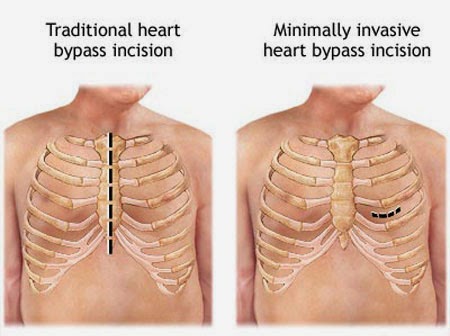
MINIMAL INVASIVE CARDIAC SURGERIES
In contrast to open-heart surgery, which involves cutting through the breastbone, Minimally Invasive Heart Valve Surgery and Minimally Invasive Heart Bypass Surgery involves making small incisions on the right side of the chest to access the heart between the ribs.
To treat a number of different cardiac problems, Minimally Invasive Heart Valve Surgery is an option. Many patients may have less discomfort and recover more quickly from this form of surgery than from open-heart surgery.
As the name suggests minimal invasion is made to access the heart for the operation. As compared to open heart surgery invasion MICS is only 4 inches. An incision is made on the left/right side between the ribs to access the heart. Not all cardiac surgery patients can opt for MICS. The cardiac surgery team reviews all diagnostic test and then decide if the patient is fit for MICS.
Normally MICS procedure is for young and middle age patients. Old age with good health can go for MICS. MICS is not advisable in patients with ages below 12.
Patients who cannot undergo MICS are:
● Having lung problems
● Having blocked arteries in the body
● Having multiple pathologies
● Have complicated or emergency case
Why is Minimally Invasive Heart Valve Surgery done?
With minimally invasive cardiac surgery, a variety of heart treatments can be carried out, including:
1. Replacement of the aortic valve.
2. Closure of the patent foramen ovale and an atrial septal defect.
3. Surgery for atrioventricular septal defects.
4. Surgery to bypass the coronary arteries.
5. Using a maze to treat atrial fibrillation.
6. Replacement or repair of the mitral valve.
7. Harvesting a saphenous vein for a coronary artery bypass procedure.
8. Replacement or repair of the tricuspid valve.
THE BENEFITS OF MICS ARE :
● Less painful
● Healing time is faster
● Less blood loss
● Chances of infection are less
● Less duration of Hospital stay
● Smaller incision
● Fewer physical restriction
● Minimal scar
Not everyone needs Minimally Invasive Heart Surgery. If it is possible to treat your disease, your doctor and the rest of your care team will decide together. Your doctor will likely evaluate your medical history and likely request tests to learn more about your heart health in order to decide whether minimally invasive heart surgery is the best course of action.
A sophisticated surgical operation and minimally invasive heart surgery call for education and experience. Dr. Jigar K Shah is among the most skilled Cardiac Surgeon in Lucknow for performing Minimally Invasive Heart Bypass Surgery and Minimally Invasive Heart Valve Surgery.
What to Anticipate During a MICS?
Robotic heart surgery, thoracoscopic surgery, and chest surgery through a small incision are all examples of Minimally Invasive Heart Valve Surgery and Minimally Invasive Heart Bypass Surgery. In each type, doctors make a tiny incision between your chest ribs to access your heart.
The surgeon uses a gadget with a tiny video camera introduced via one of the incisions to assist in viewing inside your body. Similar to open heart surgery, the majority of minimally invasive procedures employ a heart-
lung bypass machine. Throughout the process, the machine keeps blood flowing through your body.
Thoracoscopic procedures
In thoracoscopic surgery, also known as a mini-thoracotomy, your doctor makes a small incision in your chest and inserts a long, thin tube called a thoracoscope that houses a tiny video camera.
Long devices that are introduced through tiny incisions between your ribs are used by your surgeon to repair your heart.
Following The Mics
Typically, you'll stay in the intensive care unit for one to two days (ICU). Via intravenous (IV) lines, fluids, and drugs will be administered to you. Additional tubes inserted during surgery will drain blood and fluid from your chest as well as urine from your bladder. Oxygen may be administered to you via a face mask or nasal prongs.
You will be transferred from the ICU to a regular hospital room after a few days. Your condition and the nature of your surgery will determine how long you stay in the ICU and hospital.
Our medical staff will:
Keep an eye on your health and look for any symptoms of infection around your incision sites.
Keep an eye on your heart rate, respiration, and blood pressure.
Together, we will manage your pain.
1. Get you moving and provide you instructions to progressively improve your exercise levels. teach you to cough to keep your lungs clear and how to perform deep breathing exercises.
2. Throughout your recuperation, your doctor will provide you with guidelines to follow, such as keeping an eye out for indications of infection, taking care of your incisions, taking medicine, and managing discomfort.
3. When you can resume regular activities like working, driving, and exercising will be determined by your doctor.
Results
Your quality of life may increase and aortic stenosis symptoms may be lessened with Minimally Invasive Heart Valve Surgery.
To keep an eye on your heart health, you'll often need to visit heart specialist in lucknow on a frequent basis, where your heart's health may be tested.
A heart-healthy lifestyle, which entails living a balanced diet, working out, managing stress, and abstaining from tobacco use, may also be advised by your doctor. Cardiovascular rehabilitation is a tailored course of instruction and exercise intended to enhance health following heart surgery.
OUR SPECTRUM :
1. MICS ASD CLOSURE
2. MICS AVR
3. MICS MVR
4. MICS CABG
